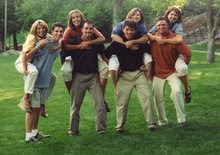Born in Burnley, Lancashire, England.
The eldest son of Joseph K. and Margaret Spottswood Thomas.
His father was an accomplished musician who played the French Horn.
When Charles was seven his father began teaching him the French Horn.
At nine, Charles performed with his father at the
Theatre Royal, Newcastle-on-Tyne.
His father, recognizing his unusual abilities, arranged for
him to be tutored in London with Professor
Thirlwall, of the Royal Theatre Orchestra, Covent
Garden, where he graduated "with honor."
.
While a musician in London at seventeen years of age,
he first heard the gospel preached by L.D.S. elders.
He was baptized that same year in 1850.
.
For the next 10 years he was involved with many prestigious
music festivals, choruses and orchestras.
Three seasons he traveled with an Italian Opera Co. to Scotland.
He also published some of his compositions, which had been
successfully performed at several London theaters.
.
May 11, 1860 he bade farewell to Old England and sailed
on the ship "William Tapscott ", arriving June 16, 1860
in New York with his wife, his widowed mother and younger sister
Margaret, (who later married George Romney, Mitt's g. grandfather).
.
For a year in New York, he filled engagements with different
orchestras of the theaters which were most popular in that city.





















